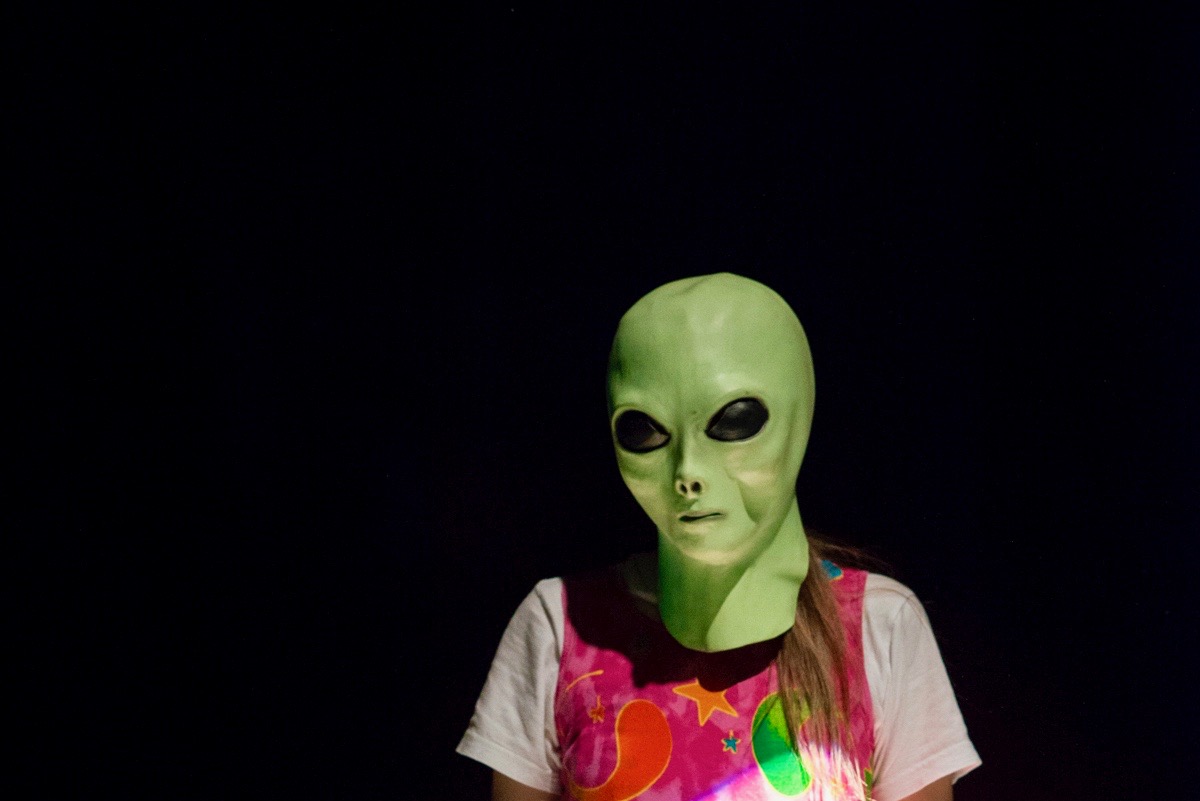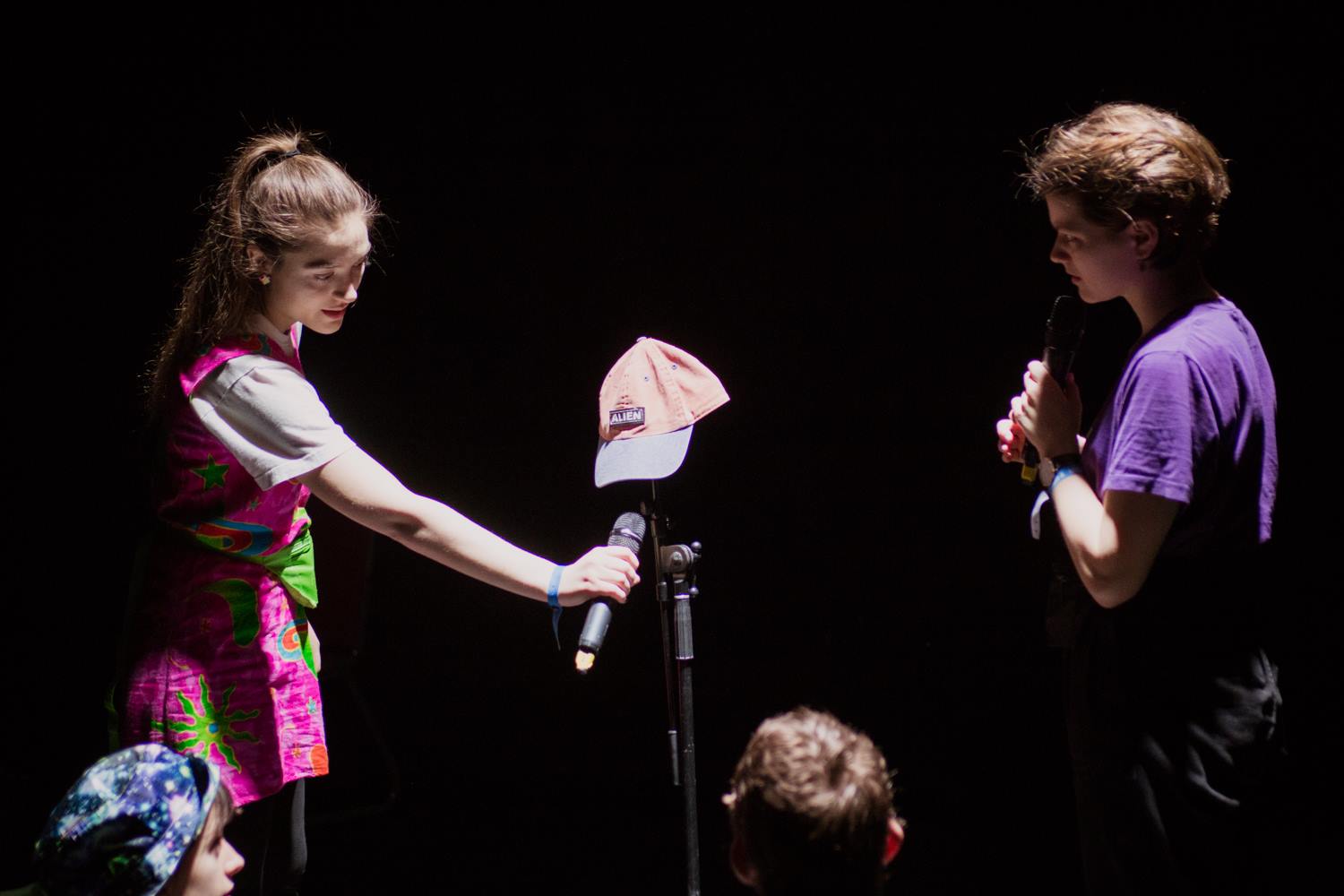
Jack Bradfield is a member of Poltergeist, an award-winning experimental company that makes work that is generous, hilarious and human. Their play Lights Over Tesco Car Park won the Samuel French New Play Award at the 2018 National Student Drama Festival, and enjoyed a sell-out run at the Edinburgh Fringe.
Here, Jack shares an insight into how the show was originally made and offers his suggestions for theatre companies wanting to stage it in the future.
Firstly, can you talk a bit about where the initial idea for Lights Over Tesco Car Park came from?
Spoiler Warning for Lights Over Tesco Car Park!
How on earth do you make a show about aliens? It was a question we’d been orbiting for a while. Not that there haven’t been successful attempts at staging science-fiction, but low-budget versions of the genre are few and far between. Poltergeist likes a challenge, and this felt a good fit. Also, for me, the show started with an image: a pulsating red light that had appeared at night over the carpark of my local supermarket. It turned out to be the light on the top of a crane, but there was a good few seconds when it could have been something else.
We set one very clear rule before we started [making the show]. Nothing was to be written down before entering the rehearsal room. It was a bold decision, but one that paid off. The ideas that we brought to the rehearsal room (a scout hut down my road) were many and various, but we only kept the really good ones — the ones we couldn’t get out of our head.
In retrospect, however, I’ve done a lot of thinking about where the piece came from — what was buzzing around our heads at the time? Questions about truth were in the air, and ripe for wrestling with on stage. We were living in, and still are, a time of stark political and social division, and I think we wanted to see if the theatre can be a sort of utopian place where we can all come together, just for a moment. It’s a story about trying to understand a person who has had a very different lived experience to the central characters. A story of loneliness and belonging. It was also written and set in Oxford — aliens in Oxford: no one had really done that before, it felt incongruous and fresh, so that was a nice starting point.
And what was your creative process like as a company?
Well, we began completely from scratch. Games, improvisation, and discussion took the fore early. We actually found our story — Robert and the alien — quite quickly. We grabbed this idea of an investigation, Scooby-Doo style: a gang of friends on a mission to get to the truth and work out who and what to believe.
Then, we had to work out the form of the piece. We wanted to know the rules of the show — how did our story unfold, how did our characters interact, and what was their relationship with the audience?
We looked at lots of work that we really liked, and tried to work out why we liked it.
We looked at genres that we hadn’t quite got to grips with yet — verbatim theatre came up a lot — and spent time working out why it’s good. We decided what we liked most about the verbatim form is its ability to make what’s on stage feel undoubtedly solid and real. To fake a verbatim piece, then, felt like exactly the right form for a play concerned with what’s true and what’s not.
The interactive stories came later, after we asked: can we get the audience to lie too?
Jack Bradfield in the rehearsal room. Photo: Georgie Hook
The play is visually very innovative on the page as much as on stage. What is the effect of using a non-traditional form: how does it help you to tell this particular story?
It’s a collage piece. There’s a through-line — about Robert and his alien — but it also jumps around in all sorts of directions: sketch, dance, clowning. Every trick in the book. Poltergeist love puzzles. And we believe that no matter how tricky they are, if you present them in a bold and entertaining way, our audience will always be ready to work them out. We were interested in letting the audience triangulate a problem, and work out what they think. (Believe it or not, the ‘poo brownie’ scene is really important to the argument of the show.)
This is a really playful show too. It’s vital to the piece in performance, and we wanted it to be vital to the script. We’re looking to make you to feel that sense of risk when you’re reading it, and we’ve done our best to imbue the page with a character of its own. As a young theatregoer, I think my favourite moments were the ones that reminded me the theatre is a place of total risk and total experimentation. We didn’t see why the same shouldn’t be true for playtexts.
My favourite part of the script is the monologues: they were performed in a random order each night on stage, so we’ve tucked them away at the back and encouraged you to cut them out and slot them in the book however you like. A genuinely randomised playtext!
What did you want audiences to take away from your production?
Lights Over Tesco Car Park is asking a lot of different questions from a lot of different angles — that’s important to us as theatremakers. I also think it’s a show that doesn’t hand out all the answers.
Our devising process has always put audience experience first, so we’re always asking questions about how an audience accesses the story. On one level it’s a paranormal-investigation-alien-mystery, and we absolutely want an audience to go on that journey. But we also want audiences to think about the assumptions they made while watching. The story’s not real. What are the implications of that? What judgements did they make about our central character Robert (who never appears on stage)?
On another level, we’re thinking with the audience about what the theatre’s for. What does an act of collective imagination do to a room? Does it tie us together, and if so, how long does the magic last?
In your note on the playtext, you write: “When you perform it, please change it again.” Do you have any advice for companies looking to stage the show and make it their own?
The text is a blueprint. We want it to be a playground in which you can do whatever you want—change the music, the colours, the costumes, the shape, the tone, the dance moves!
However, I think the most important advice for the shape of the story is that you need to persuade your audience that Robert is real. Otherwise the payoff/ reveal can falter a little. Change the characters names to your own names, change the locations to ones in your town, adapt the characters to suit yourselves.
Start the lie early — make a pact before you start the show that you’ll lie to everyone: friends, family. Tell them all you’ve met this man who thinks an alien is coming to stay in his home. See if you can keep it up until the performance.
Lights Over Tesco Car Park at the 2018 Edinburgh Fringe. Photo credit: Giulia Delprato
There are various elements of the play that involve audience members. What guidance might you give for performers when working with bringing members of the public into a show in this way?
This is really hard, and needs lots of practice. I’ve lost count of the number of friends that passed through the doors of our rehearsal as willing guinea-pigs.
Early on we developed the idea that we would only pick audience members who readily volunteered themselves for the job. This meant everyone who took a trip onto the stage was in the right mood to take part.
We learned to always be excited to see the audience. Always be excited about what they might bring. Always work with the tones and jokes and ideas they bring onto the stage. If you try and force your version of the story on them, it will never work. You’ve got to respond to their version of the story. At the end of the show, you’ve got to get everyone on stage, waltzing under the stars. To pull that off, the audience needs to have confidence in you.
Lights Over Tesco Car Park enjoyed a brilliant run at the Edinburgh Fringe Festival, and your company is taking up another show this summer. What makes the Fringe such an important platform for new work?Do you have any tips for companies who want to perform there in future?
At the Fringe, there’s so much art in one place. Theatre, comedy, dance, everything in between. That’s the exciting thing. We met the most amazing, talented makers up there, and I think that’s the main reason to attend. Whether or not it will be a platform for your piece is a roll of the dice, but as a learning experience, where you can see amazing work and then literally talk to the people who made it immediately afterwards — there’s nothing else like it.
I think our advice is to begin prepping early — a year or two in advance. Make sure you’ve got the right piece, the right support, and that you’re ready to work hard. You’ve got to balance your love of your project with caring for everyone in the company, both practically and emotionally. The more preparation, the more you’ll get out of the Festival. It’s a totally exhilarating few weeks, but you’ve got to stay steady… no matter what happens up there!
Our new piece is heading up this year. We’re challenging ourselves all over again. It’s about an Art Heist. A notoriously risky business.
Buy the script for Lights Over Tesco Car Park and learn more about licensing the show.
Photo credit (top): Giulia Delprato

Comedy Mysteries: Gasps, Laughs and Thrills

A Children’s Theatre Classic: An Interview with Snow White And The Seven Dwarfs Composer Michael Valenti



